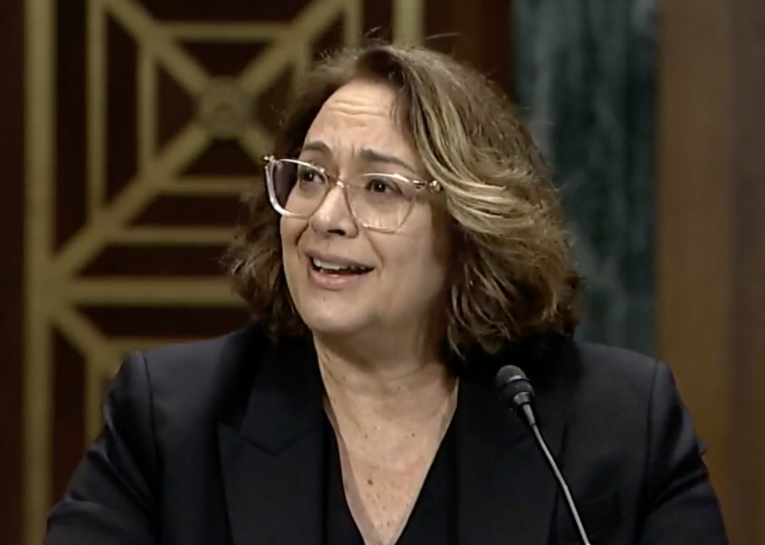
- Details
- By Native News Online Staff
National Native American organizations are praising the U.S. Senate confimation of Judge Shanlyn Park, the first Native Hawaiian woman, to the U.S. District Court for the District of Hawai'i. The National Congress of American Indians (NCAI), the Native American Rights Fund (NARF), and the National Native American Bar Association (NNABA) released a joint press statemtn on Thursday afternoon.
Judge Park was confirmed by a bipartisan vote of 53-45.
“The U.S. legal system will benefit from the unique combination of wisdom, experience, knowledge, and perspective that Judge Park will contribute to the District of Hawai’i," NCAI President Mark Macarro said, “and NCAI commends President Biden for nominating Judge Park, Senators Hirono and Schatz for their strong support of Judge Park, and for the votes cast by the Senate to make this historic appointment happen.”
Despite the outsized impact federal court decisions have on Native communities, Native people are under-represented in the federal judiciary. Even with Judge Park’s confirmation, of the more than 870 authorized federal judgeships, only seven judges from American Indian, Alaska Native, and Native Hawaiian communities currently serve on the federal bench. As a Native Hawaiian who lives, works, and volunteers in Hawai'i and who has deep ties to her community, Park understands how federal laws and policies profoundly impact the daily life of Native Hawaiian, American Indian, and Alaska Native people.
 Make A Donation Here
Make A Donation Here
“Federal courts hear many cases involving Native people so federal court judges must be aware of the political status, legal principles, and rights of Tribal Nations and Native individuals,” said NARF Executive Director John Echohawk. “The confirmation of Judge Park takes a step in the right direction for a more balanced and representative federal judiciary system.”
Native Hawaiians comprise 21.8 percent of the population served by the district where Judge Park will preside.
“Inclusion of Native Hawaiians in the courts that preside over matters in Hawaii is critically important to advancing trust in the judicial system and the rule of law. Judge Park’s deep experience in Hawaii state and federal courts, in criminal and civil matters, and her deep connections to the communities her district serves will be a great asset to the court and will help increase trust in the federal justice system,” Makalika Naholowaʻa, president of the National Native American Bar Association, said.
U.S. Senators Brian Schatz (D-Hawai‘i) and Mazie Hirono (D-Hawai‘i) released the following statement after voting to confirm Judge Park:
“With decades of experience practicing law in Hawai‘i, Judge Park has led a distinguished career dedicated to public service. She has exhibited a commitment to justice, fairness, and impartiality throughout her career and is highly qualified to serve on the U.S. District Court. As the first Native Hawaiian woman to serve as a federal district court judge, Judge Park’s confirmation reflects the Biden-Harris Administration’s commitment to building a federal judiciary that reflects the diversity of our communities. We were proud to support her nomination and know that she will serve Hawaii and our country with honor.”
More Stories Like This
Native News Weekly (August 25, 2024): D.C. BriefsUS Presidents in Their Own Words Concerning American Indians
Native News Weekly (January 18, 2026): D.C. Briefs
Federal Judge Orders ICE to Halt Use of Pepper Spray, Arrests of Peaceful Protesters in Twin Cities
Tunica-Biloxi Cultural Leader John D. Barbry Walks On
Help us defend tribal sovereignty.
At Native News Online, our mission is rooted in telling the stories that strengthen sovereignty and uplift Indigenous voices — not just at year’s end, but every single day.
Because of your generosity last year, we were able to keep our reporters on the ground in tribal communities, at national gatherings and in the halls of Congress — covering the issues that matter most to Indian Country: sovereignty, culture, education, health and economic opportunity.
That support sustained us through a tough year in 2025. Now, as we look to the year ahead, we need your help right now to ensure warrior journalism remains strong — reporting that defends tribal sovereignty, amplifies Native truth, and holds power accountable.
 The stakes couldn't be higher. Your support keeps Native voices heard, Native stories told and Native sovereignty defended.
The stakes couldn't be higher. Your support keeps Native voices heard, Native stories told and Native sovereignty defended.
Stand with Warrior Journalism today.
Levi Rickert (Potawatomi), Editor & Publisher

